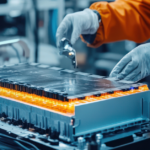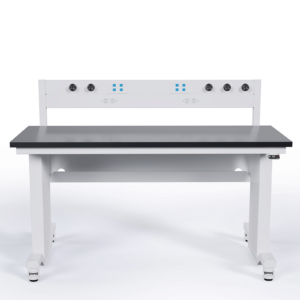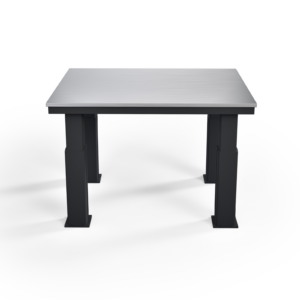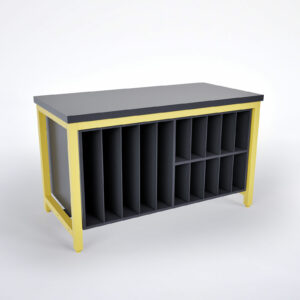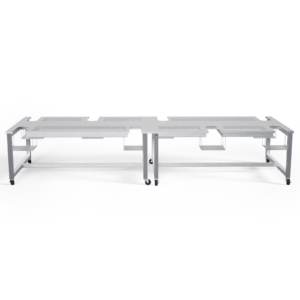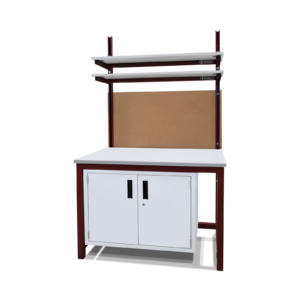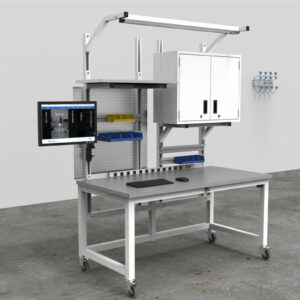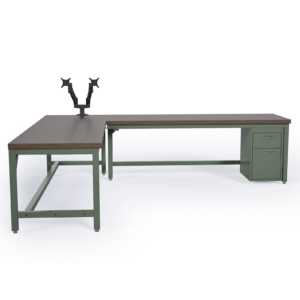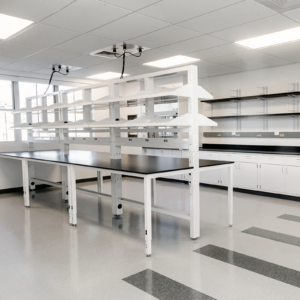Sometimes the best location for a new laboratory or tech repair center isn’t a new building, it’s on the road. We take a look at the growing phenomenon of deploying mobile labs and mobile repairing centers to locations where they are needed most. From mobile healthcare and environmental testing labs working in remote locations to identify dangerous diseases and contaminants to mobile repair labs kitted out with the latest tools and equipment needed to make convenient tech repair “house calls,” mobile labs and mobile repairing centers are on a roll.

We live in an ever increasingly fast-paced world, where saving time is a priority.
That’s just one of the reasons for the recent uptick in mobile lab and repair center businesses.
Once considered a niche market, mobile labs are now taking an increased share of business away from fixed location laboratories and repair centers, thanks to their ability to deliver highly convenient services on-site — at a customer’s physical location.
7 Different Market Applications for Mobile Labs and Mobile Repairing Centers
Which market sectors are deploying mobile labs?
Here are seven key markets where mobile labs have had a significant impact by bringing laboratory resources to where they are needed most:
1. Biosafety Mobile Labs Used to Respond to Dangerous Public Health Outbreaks
Thanks to increased air traffic, the world is a smaller place. As a result, air travelers can unwittingly transmit contagions across the globe even before showing signs of illness. Localized outbreaks of disease can also spread rapidly in large urban areas.
To combat these public health emergencies, health authorities are increasingly turning to mobile labs to provide field testing services, such as Ebola virus testing facilities in Africa. Today’s modern mobile laboratories can be certified to handle dangerous pathogens at BioSafety Levels (BSL) 2 and 3. A good example is the European Mobile Laboratory Project, which supports the World Health Organization’s Global Outbreak and Response Network.
2. Mobile Healthcare Labs Provide On-Site Medical Care and Education
Miniaturization and automation of laboratory testing equipment have enabled healthcare providers to deploy mobile labs capable of dispensing patient diagnostic testing as well as outpatient services to underserved rural locations.
Some notable examples include:
- Modular EP Unit at La Porte Regional Health System (La Porte, Indiana), which provides patient cardiac diagnostic and cath lab services previously only available in large metro areas.
- Mobile Clinical Patient Simulation training labs provide on-site training and skills assessments for healthcare providers located in rural regions. For example, the Baylor Scott White Hospital mobile lab serves central Texas, while the Southeast Technical Institute’s Mobile Training Lab provides training for aspiring healthcare professionals interested in nursing careers.
3. Military and Government Agency Mobile Laboratory Applications
The five service branches of the U.S. Armed Forces each have their own unique needs for mobile labs and mobile repair units. This is especially true in the support logistics arena, where military supply chain professionals need to deliver quality materials and supplies to troops deployed overseas.
For example, the U.S. Army Oil Analysis Program Office created two mobile laboratories (one was deployed in Afghanistan and the other in Iraq) to provide field testing of oil supplies used in U.S. Army aviation and military combat operations.
As a GSA approved vendor, Formaspace has been awarded a variety of contracts to build military-grade mobile units, such as this mobile field laboratory built for the military.
Government agencies are also increasingly using mobile labs to support their missions. A mobile lab custom built for the Environmental Protection Agency’s Region 6 (based in Dallas) is a good example. This 5th wheel trailer-mounted mobile laboratory allows EPA scientists and enforcement agents to work on site to monitor and analyze pollution levels in our waterways, in the ground, and in the atmosphere.
4. Mobile Lab Units Designed for Civil Defense as well as Disaster Recovery & Response
Government agencies and disaster relief organizations are also increasingly investing in mobile lab units to provide emergency responders with a safe place to work during natural disaster events, whether it be an earthquake, volcanic eruption, wildfire, flood, or hurricane.
Mobile lab units can be configured to serve a wide variety of disaster response needs, including:
- Mobile Command Units
- Secure Communications Units with Satellite Hookups
- Weather Station Tracking and Disaster Mapping
- Hazardous Materials (HazMat) Mitigation
- Portable Sanitation Station (Incl. Potable Water and Restroom Facilities)
- First Aid and Vaccination Clinics
Consumer product giant Procter & Gamble have also stepped up to create their own mobile disaster response vehicle as well. Their trailer-based “Tide Loads of Hope” is equipped with 32 high-efficiency washers and dryers on board; the system is capable of washing and drying up to 300 loads of laundry per day, providing welcome relief to disaster-stricken families with no access to clean clothes.
5. Mobile Repair Centers Bring Businesses Closer to the Customer
Thanks to productivity devices, such as PCs and smartphones, we can work from anywhere. Yet all that productivity goes out the window the moment disaster strikes — such as when we drop our cell phone (only to see it fall in slow motion, shattering the screen on an unforgiving tile floor) or we watch in horror as our morning latte spills across our laptop keyboard.
What to do? Answer: Call your nearby mobile repair center, who will come to your home or office to perform the repair on-site at your convenience.
While it may be difficult to get a doctor to make a house call, a new breed of entrepreneurs have figured out that customers want the repair to come to them, not the other way around.
Popular mobile lab concepts that bring repair services to the customer include:
- Mobile car and bicycle repair
- Mobile glass replacement
- Mobile car dent and ding repair
- Mobile car detailing
- Mobile water/fire damage mitigation
Customers appreciate the advantages of mobile repair labs, which eliminate time wasted waiting at a repair shop for an appointment, as well as the ability to oversee and check the quality of the work performed during the repair.

Mobile Labs for On-Site Media Production and Maintaining Communications Infrastructure
Sending a camera operator and a television reporter out into the field to film a live shot is not new (see the photo of a 1949 Dumont Telecruiser below). What’s new is how much smaller and more sophisticated the equipment has become. For example, video hardware companies, such as San Antonio-based Newtek, with their TriCaster product line, and Sling with their Sling Studio, are making gear that’s small enough to fit in a backpack. This means an entire TV station or mobile media production crew can fit in a modest-sized mobile lab.

Maintaining our communication infrastructure is another important application for mobile electronic labs. Some of the specialized implementations in current use include:
- Mobile labs to test and maintain cellular, microwave, IR/Optical fiber, and satellite communication links
- Mobile labs to test and maintain terrestrial television and radio transmissions
- Mobile labs for maintaining and splicing optical transmission lines
- Mobile labs to provide temporary cellular service
7. Community Outreach: Mobile Labs for On-Site STEM Education and Makerspace Access
Just as the Bookmobile brings books to communities without nearby library access, today’s new generation of mobile education labs brings STEM learning resources and access to Makerspaces to under-served communities areas.
For example, the Girl Scouts organization in Pennsylvania created the “STEM Mobile,” which serves a 30-county region within the state. The Girl Scouts’ STEM Mobile lab offers hands-on experiences in science, technology, engineering, and math by providing on-site opportunities to learn about robotics and virtual reality. Another organization, STEM Scouts, is bringing their mobile lab, dubbed The Vortex, to schools around the country.
Makerspaces are also going mobile. The Fab Lab network of makerspaces has introduced a mobile learning platform, called the Mobile Fab Lab, which allows students to learn about digital fabrication technology by learning about digital prototyping techniques, including CNC wood routers, 3D desktop mills and scanners, and 3D printers.
Mobile Lab and Repair Unit Design Considerations
In this section, we’ll look at some of the basic design considerations to consider when planning your custom mobile lab or mobile repair station.
However, given the wide variety of custom design options, we also recommend you connect with your friendly Formaspace Design Consultant to discuss specific information about your project’s requirements.
Choosing the Right Mobile Lab Form-Factor
Typically, most mobile labs use one of three different form factors: van conversion or truck-based, trailer-based, or container-based.
A) For residential or urban access, choose van conversion or truck-based mobile labs
Given the smaller size of a van or truck-based mobile labs, you may need to plan more carefully to fit all your equipment neatly inside. However, you’ll enjoy increased maneuverability in smaller urban and residential streets. Be sure to consider overall height, width, length, and weight to ensure access to parking garages, parking spaces, and low clearance overpasses.

B) For larger projects, choose a trailer-based mobile lab
Trailer-based mobile lab projects are a good option when you need more interior space to accommodate more gear and/or personnel. Trailers aren’t quite as maneuverable as a van or truck-based conversions, but they can still reach remote areas or urban locations with long, pull-through parking spaces. Smaller conventional and 5th wheel trailers can be towed by heavy-duty pickup trucks or SUVs, while the longer, heavier trailer-mounted mobile labs need the towing power of a full-size semi-truck.
C) For semi-permanent installations or overseas projects, choose a container-based mobile lab.
If your mobile lab project will be in a static location for a period of time, why not consider a shipping container conversion? These can be mounted on flatbed trailers when they need to be moved around, or they can be mounted on the ground for extended use. Shipping containers provide a robust platform that is weather resistant and durable. It’s also an ideal choice for overseas mobile lab projects; after all, shipping containers are meant to be shipped!
Common Design Elements Used in Mobile Labs and Mobile Repair Units
Here are some design considerations that generally apply to most mobile lab projects (As each mobile lab project is unique, we encourage you to take advantage of the expertise offered by our Formaspace Design Consultants.):
Providing Proper Work Areas with the Right Work Surfaces
How many people will be working in the mobile lab? What worksurfaces are most appropriate to the task? Choices ranging from bacteria-resistant laminate to heavy-duty stainless steel, to surface with built-in EDS protection (for electronic gear repair). Formaspace can also design custom workstations and desks (including height-adjustable desks) to provide maximum ergonomic comfort for personnel of different sizes.
Custom Storage and Fixed Casework
One of the advantages of a custom mobile lab is the opportunity to design custom furniture and storage so that every piece of equipment has a proper home. Choose from our line of customized modular lab furniture or custom built fixed casework.
As a starting point for designing custom lab furniture for your mobile laboratory, check out our compact yet powerful Triton™ integrated Lab Services Bench. Depending on your needs, this lab bench can be extended, modified, or customized for any use. Speak with your Formaspace Design Consultant for more ideas.
Secure, Vibration-Free Mounting
Sensitive test equipment needs to be protected from vibration, such as when the mobile lab is on the road. Formaspace can work with you to assure that each piece of lab test equipment and every tool has a safe, secure, and vibration-free storage location.
Comfortable Yet Compact Seating
How much seating will be required in your mobile lab? To save space, seating can be either built-in or designed to fold up neatly to be stored in less space.
Choosing the Right Power Systems
What amperage and voltage will be needed on board? Will the mobile laboratory need to provide its own power (via a solar array, for example?) or work off batteries? What power conversion equipment is needed?
Establishing Communication Links
What are the mobile lab’s communications requirements? Will it need satellite uplink capability, Wi-Fi or blue-tooth connections, or another secure form of communications?
Provisions for HVAC, Ventilation, and Airflow
Small, enclosed spaces can heat up quickly, and this can be compounded by heat generated by electronic equipment and personnel on board. What are the heating and cooling requirements in the environment where the mobile lab will be used, e.g. how much conditioned air will be needed? Can shade canopies and cross-ventilation systems assist? Mobile labs handling dangerous substances will also need fume ventilation and air filtering systems to protect personnel.
Water, Liquids, Gases, Test Sample Storage and Waste Disposal
Potable water for drinking and sterilized water for testing purposes are two examples of the need to store liquids on board. For example, our Triton™ integrated Lab Services Bench can handle a variety of water and gas lines and can be customized further to meet your needs. Depending on the type of laboratory, there may be a need to store hazardous materials on board, such as blood and tissue samples (in a medical setting, for example), or to collect and store different gases (for environmental assessments, for example). Mobile labs handling hazardous materials will need garment storage and decontamination facilities. Waste disposal of hazardous materials is another consideration (such as contaminated gowns, tissue/fluid samples, or sharps).
Lab Safety Considerations
Mobile labs working with dangerous materials (such as labs performing radiological testing, or BSL-2 and BSL-3 labs handling dangerous pathogens) need to adhere to the relevant safety certifications. Fume hoods and decontamination showers may be required. Smoke and gas detectors (important where there is a risk of dangerous gas exposure) are important considerations. Fire extinguishers or fire suppression systems need to be designed to protect your personnel and equipment.
Food Preparation and Storage
Will the lab need to store food/drinks for use by staff on board, using a small refrigerator for example? Or will it be used to serve food to the public? For food grade installations, select our all stainless-steel cabinetry and work surfaces systems to maintain sanitary conditions.
Restroom Facilities and Showers
Depending on the mission, it may be necessary to incorporate a restroom on board, or even showering facilities for personnel, such as for those who need to go through a decontamination protocol after working with dangerous materials or pathogens.
Contact Formaspace Today to Make Your Mobile Lab Design Ideas Come to Life
Need assistance? Turn to Formaspace for mobile lab expertise.
If you can imagine it, we can build it.
When you become a Formaspace customer, you’ll be in good company. We’ve had the opportunity to create custom furniture for some of the leading-edge companies in the world, including SpaceX, Oculus, Toyota, Busch, Apple, Google, Twitter, Capital One, and Parabola.
To learn more about our custom manufacturing capabilities, contact one of our friendly Formaspace Design Consultants here at our factory headquarters in Austin, Texas.
They will be happy to assist by sharing their expertise. Together, we can build the right mobile lab solution customized for your exact needs.








